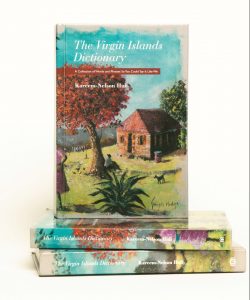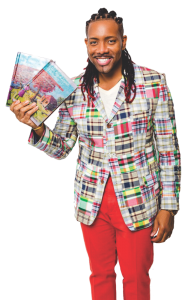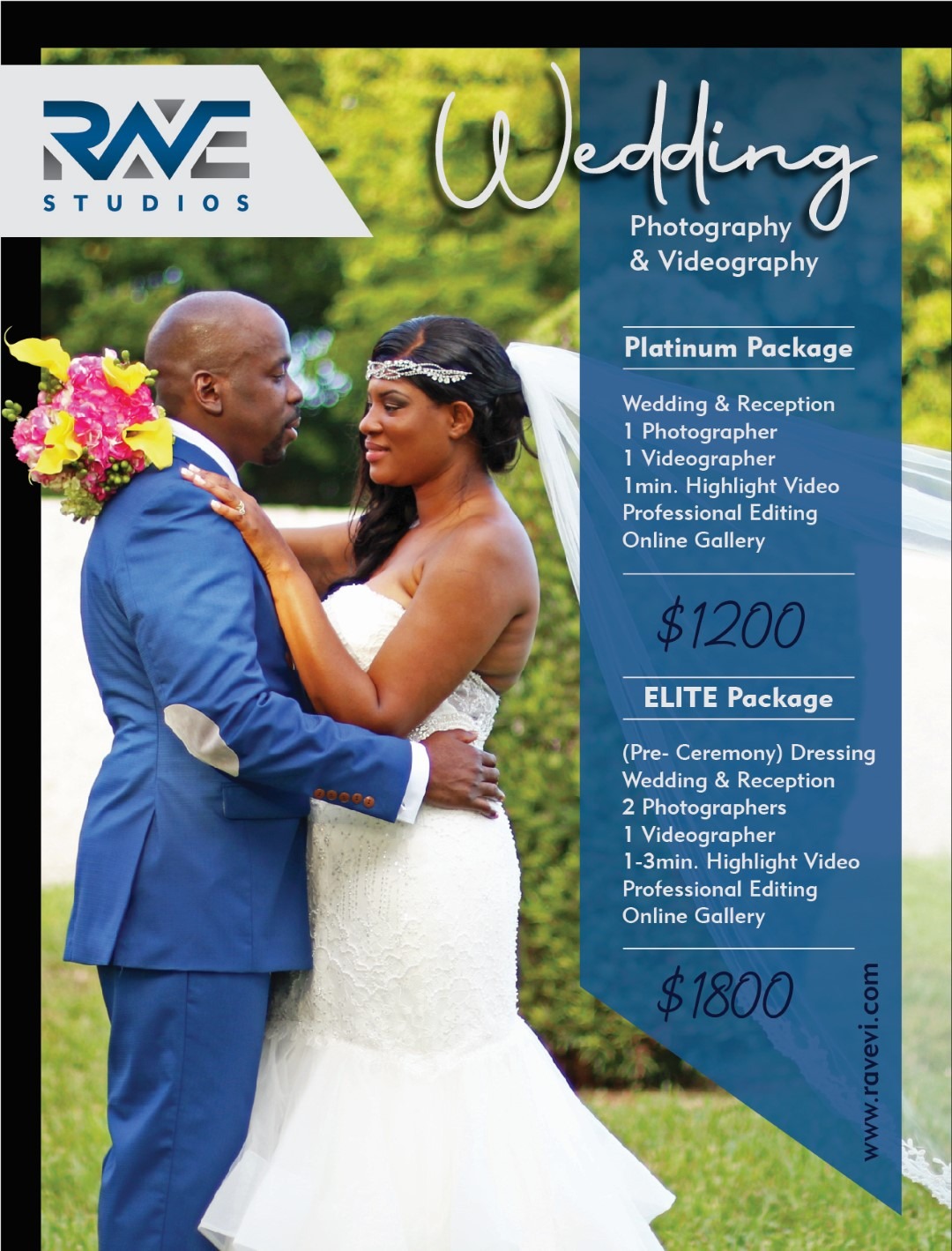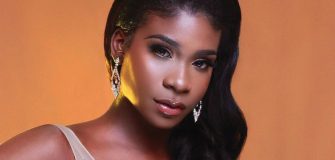Share
 There’s a new book out this holiday season, and it promises to be…well…everything you need to learn to speak like ‘we’. VI Life&Style caught up with the author for a short chat about it, and we hope you are as ready to purchase it as we are!
There’s a new book out this holiday season, and it promises to be…well…everything you need to learn to speak like ‘we’. VI Life&Style caught up with the author for a short chat about it, and we hope you are as ready to purchase it as we are!
What’s the full title of the book?
KH: It’s The Virgin Islands Dictionary: A Collection of Words and Phrases So You Can Say It Like We.
L&S: How did you come up with this concept?
KH: This book has been growing with me through time. I didn’t recognise it, but a dear friend, the late Joyce Leslie, passed through the Ministry of Education and Culture, where I was an Information Officer, told me that I should write a book. I asked her, “Write a book? About what?” She said I should write about my Virgin Islands experience. When she told me this, I didn’t give it a second thought.
Prior to this encounter, I was studying at the H. Lavity Stoutt Community College. I was in the linguistics class that was lectured by Dr. Joel Warrican. We were on the topic of semantics and words, and I asked him if he would consider how we speak here in the Virgin Islands, our dialect, an actual language. He told me he wasn’t sure, but it was something we could consider looking at once we studied all of the parts of speech.
Later, I was at the University of Miami, where I was President of the Caribbean Students Association. I was not prepared for my icebreaker that day. I decided to play a game I called How Do You Say It Where You’re From? We threw out phrases, and each person from different parts of the Caribbean said how they said it where they were from.
Fast forward to 2012; I was in the Cayman Islands. I was home, and it was a regular night. I normally pray before bed, but this night I didn’t kneel nor walk around to pray; I simply sat on the bed and prayed. As I went to lie down in the bed, I felt this very intense presence saying over and over, “You should write a book.” I also received several titles that night. I wrote them all down and started trying to figure out which one to begin with. I then felt “The Virgin Islands Dictionary,” and I began compiling words the next morning.
The first person I told about it was my friend Gorvey Henry. Since that day, he has been sending me words he comes across. I wasn’t living in the Territory at the time, so I had to rely on my memory. When I had conversations with people from the Virgin Islands, I would always take notes. Then I started reading more Virgin Islands books and made notes from them as well. So the first lists were compiled from conversations, other literary pieces written by Virgin Islanders, and people who knew I was working on it, continuously sending me words and phrases. And you would not believe it. The book is now being printing.
L&S: I’ve noticed you put some of the words and phrases on social media but also recalled a while back seeing that there was a book, but you didn’t know if you were going to publish it. I’ve just been waiting for this book and was shocked to hear that you are publishing it. What changed your mind?
 KH: I think I made that post out of frustration. I had a launch date, and a first print of the book happened before. When I announced the date, the printer then indicated that they couldn’t have the prints ready by that date, but the launch date was based on the date the printer first gave me. After the frustration, I took a step back. I then recognised that there was a blessing because when the book came the first time, the editors in the company realised that it was a dialect book. Even though they knew this, they changed a lot of things. Some words that should have been written incorrectly and were corrected. That put me back a few steps because I then had to re-edit it back to where I needed it to be.
KH: I think I made that post out of frustration. I had a launch date, and a first print of the book happened before. When I announced the date, the printer then indicated that they couldn’t have the prints ready by that date, but the launch date was based on the date the printer first gave me. After the frustration, I took a step back. I then recognised that there was a blessing because when the book came the first time, the editors in the company realised that it was a dialect book. Even though they knew this, they changed a lot of things. Some words that should have been written incorrectly and were corrected. That put me back a few steps because I then had to re-edit it back to where I needed it to be.
I think the frustration of it and the time it took probably made me feel like it was a very long road, but this allowed me to step back from the pressure of having to publish as soon as possible. I was able to take the time, get it edited a second time by one of my old teachers, Gwendolyn Smith. She sat down and edited the entire book a second time after it came from the printer. At this point, I had even more words to add. Right now, I am at the point where I feel it’s very necessary to release the book. I’ve had conversations with people. They are very excited to receive, read, and have it.
I know many other countries with dialect compilation books: the Cayman Islands, Jamaica, and Barbados. It is time that we add to this Virgin Islands conversation. We also recognize that there has been this great resurgence of Virgin Islands pride over the last five years. Since the hurricanes of 2017, we’ve been building back. Not only building back the infrastructure but also building back to what it means to be a Virgin Islander. People are proud to be Virgin Islanders, and I think this is one of the elements missing. Sometimes we laugh about it, not recognizing we have a unique way of speaking and saying things. Part of it is chronicled in 353 pages of 1,731 words.
L&S: Wow! I am excited to get it. My children are always trying to get me to say some words and say them using the local dialect. Did you ever discover if this was an actual dialect? Can the lexicon be mapped out?
KH: There are some people I’ve reached out to who believe we can do more research to find where many of the words came from. There are not a lot of words from the original African dialect, but there are some. There are more in many other countries with words directly from an African dialect, such as Jamaica. There are some words here in the Virgin Islands that we can find having a very strong African heritage. Like when we say we ‘guinea’ our hair, we now know that it comes from the area of Guinea where that braid was popular.
Whether it’s an actual language that can be considered, what I have found from the research is that Caribbean country and every place in the world has idioms or slang phrases that are used and are unique to them. They are culturally created because of the need for conversation, understanding, and learning. As you look through the dictionary, you will find that they are not only words and phrases that we say, but there is a rhythm and way they are put together in the Virgin Islands that makes them become a cultural identifying factor. For instance, if we want to intensify something, rather than say like in the United States, “She is very ugly,” we would say, “She ugly, ugly.” Repetition of that word gives you the same thing. And where we are well able to add the letter’ s’ to pluralize words, it’s more common in the Virgin Islands to say, “The shoes them.” So we add the word ‘them’ to pluralize the word. You could examine that and create an actual structure for language and how things are intensified, thereby creating linguistic rules.
L&S: You mentioned there are about 12 words that will not be included in this edition of the dictionary. Are you willing to share them?
KH: I have 12 more words and phrases to include:
- Mame look – I am still researching this meaning.
- Tek it on – This means to worry about something.
- Bark you a slap – I got this from a voice note that was shared. In the book, it says, “dab you a slap,” which is what was normally said. But you can see the evolution because the younger generation says, “bark you a slap.” Many times you recognize that things evolve to what we think we hear, but it turns out to be misphrased. We understand that words have evolved, so this needs to be included, as well.
- Jumbie Horse – I recently learned this. The colloquial term for a walking stick is a jumbie horse.
- Bust Chest – This is a new dialect created by younger people. If a guy is trying to go to a girl and she tells him off, it’s a ‘bust chest’.
Other words and phrases that are currently not in the dictionary are
- Rebutit
- Sick and Shut In
- See and Don’t See
- Done off
- Blast
- Good Ground
- Sometimish
- Valice (wa-Leese)
- Mama cut
- BVI Heritage Dancers
- Valley
- Cyad
- Whup it tuhp
- Wassi
- Drawing (bush)
- Melee Monger
- Buss it Down (eat)
- Buss a Pot (to cook)
After going to print, I realized that I needed to make sure that the young people’s words are included. I don’t know how I missed these other two examples. Ever since I was young, it’s been used: wassie. “She going on wassie.” It means she’s going on bad or having a really good dance and time or carrying on bad behavior. It was in a Jam Band song! I don’t know how I missed it.
Then there is ‘melee monger’. You’ll find the word melee in the book, as in sharing news and gossip. But the person that shares melee continuously is called a melee monger. A lot of the words have to be connected for the connections to be made. Someone who gossips may be sharing melee, but what is that person called: a melee monger. I am making a note of these so that they will be included when I do a second edition.
L&S: What’s the plan for the second edition? What will be the milestone that will indicate that it’s time to do another edition?
KH: It will be after the second book comes out. The second book will be The Virgin Islands Book of Proverbs. I am working on this right now. They have been all written, but I want to illustrate them to create a good sight connection with the proverbs. After this book is completed, I’ll look at the first revision of the Dictionary. Maybe on its fifth anniversary, I’ll include any new words and phrases that I have collected.
L&S: And this will be out for the holidays? What about the proverbs book?
KH: The launch date for the dictionary will be the first to the second week of December, so this will be available for the holiday season. It will be exclusively carried at Clover’s, and I love that connection because Clover’s is now creating a space where artisans can have retail space for their products. You don’t have to own a storefront. If the product can fit within the store and follows the guidelines of their brand, you can be there. My intention is that the virtual launch will be by December 15, and the book will go on sale right after the virtual launch.
The Virgin Islands Book of Proverbs is already in production. We have many of the illustrations from the artists already. This project is bigger because there are so many artists involved. We have to understand the proverb and then allow the artist to have the freedom to illustrate what comes to mind. This does take some time. The goal is to launch the proverbs book within 2-3 months after the dictionary. I look at specific periods. The dictionary will come out for the holiday season. The proverbs book should come out in July, around Territory Day and August Festival time.
I want to add that I’ve had some informal presentations on the book. I have recognised an excitement and hunger for this part of the Virgin Islands’ identity. I personally buy every book authored by Virgin Islanders and within the Virgin Islands. It’s important to me to have that collection as part of our identity, and I think this book will add to that. I also recognise that even young people who have seen the book think it’s a lot, but once they crack the pages and read the words, they will laugh. What that laugh symbolizes for me is them seeing themselves in the book. They will see that they have used the words before or heard words but didn’t understand it before. They may even say, “Oh, my mother used to always say this!” Now they will have something to support it or refer to if they are looking for something. It will also help with spelling because I did work with some phonetic experts to decide on the best spelling based on how it is used and pronounced. I believe the dictionary will fill a void and satisfy a hunger for the Virgin Islands tongue to be captured in this way. The book will not only be great for Virgin Islanders to own but also be a great keepsake to gift to others. When people come here, they hear us speak but may not understand it. Now you have a guide to un-code the way we speak.
L&S: I do get that the general feeling of the quotes and phrases to put on VIligual are fun. To hear that, you will define the spelling of the words because I’d asked my family what ‘inna’ was. They are trying to figure it out, but you see, it spelled ‘inna’, ‘innu’, and ‘inno’, and all of these are the same words. I would ask, “How am I supposed to know this!”
KH: There is fun in it. The book was not written as a college guide or some great educational authority. It does have an air of that. However, when the word is used in a sentence, that’s where I capture the fun because it gives us a chance to laugh at ourselves. The sentences are very animated to make sure the words are expounded upon and explained very well. You will find that the sentences are very ‘tongue in cheek’, cheeky, rude, and hilarious. They are intended to capture the lighter side of Virgin Islanders.
L&S: Just one more question: will the book look like a typical dictionary?
KH: It does. It actually follows the same format. There’s the word, its part of speech (noun, verb, adjective, adverb), its pronunciation, and as many definitions, I could find. Unlike many dictionaries, this one gives you sentences on how actually to use the word.
VI Life&Style encourages everyone in the reading audiences (print and online) to grab this book entitled The Virgin Islands Dictionary: A Collection of Words and Phrases So You Can Say It Like We by Kareem-Nelson Hull from Clover’s. Clover’s can be found in the heart of Road Town in the yellow and green building. You can also follow the Facebook page @TheVirginIslandsDictionary for more updates.



